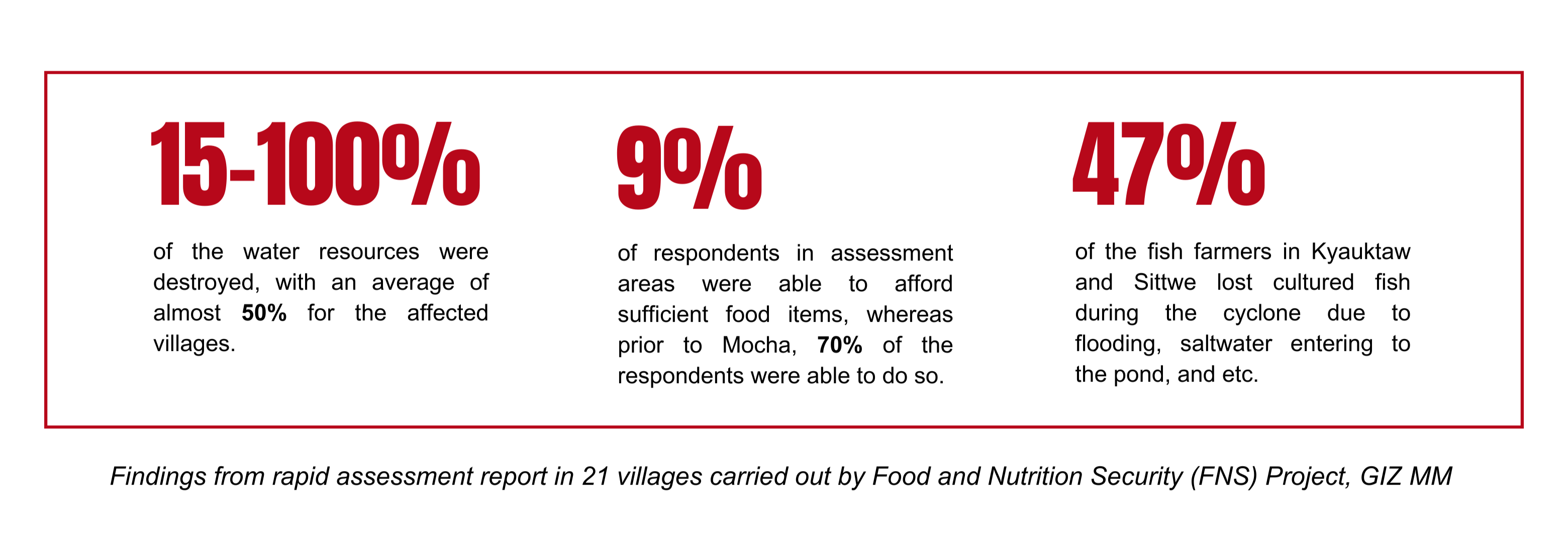Responding To a Double Crisis Scenario: GIZ-Emergency Food and Nutrition Security Response in the aftermath of Cyclone Mocha

Located on the beautiful west coast of Myanmar, Rakhine State is home to a rich cultural heritage and breathtaking natural landscapes. The region is famous for its beautiful beaches and historic temples dating back centuries. However, behind its calm facade is the harsh reality of widespread poverty and malnutrition, worsened by a series of armed conflicts, natural disasters, and unresolved political turmoil.
Food insecurity and malnutrition remain a challenge for the poorest and most vulnerable people in rural areas of Rakhine State. (Global acute malnutrition (GAM) in Rakhine State is 13.9%, while the Serious Acute Malnutrition (SAM) prevalence is 3.7%, according to United Nations statistics). Low nutritional dietary diversity, inadequate hygiene practices, poor sanitation, and limited access to basic health facilities and services are the main roots of malnutrition. Moreover, fewer income opportunities, lower and more difficult access to markets, frequent and numerous natural disasters, and political conflicts obstruct and hamper improvements towards food and nutrition security.
GIZ has acknowledged the region’s different factors of vulnerability and has prioritised the resolution of the most critical and urgent concern for food and nutrition security since 2016. The Food and Nutrition Security Project (FNS) seeks a holistic approach to malnutrition, especially among women and children. The FNS project covers an array of development initiatives, including agricultural development, livelihood diversification, health, WASH, and nutrition interventions, and community empowerment initiatives. To safeguard that the implementation efforts are grassroots, FNS works together with farmer groups, volunteers, as well as both local and international NGOs.
In May 2023, Cyclone Mocha made landfall with unprecedented ferocity, with gusts of up to 250 kmph, making it one of the strongest cyclones on record to hit the country. Its timing couldn’t have been crueler, striking just before the start of the monsoon season. The cyclone and the ensuing flooding devastated communities across Rakhine, the Northwest, and Kachin with thousands of homes, productive assets, vast swathes of farmland (48,000 hectares of agricultural land unusable for harvesting), 80% of schools damaged, over 40,000 houses destroyed, and critical infrastructure such as hospitals severely damaged. It added an additional 500,000 people in need of humanitarian aid and worsened the needs of 1.1 million people already.
Despite the challenging settings after the cyclone, the FNS project team managed to reach out to communities in project regions and undertook a rapid assessment to analyse the pressing need on the ground.


Based on the findings of the assessment, the FNS project team implemented several emergency response measures in severely affected areas following a coordinated response plan. The measures taken were influenced by many factors, including the availability of commodities in accessible marketplaces like Sittwe and Yangon, specific requests from village leaders, and the immediate need to meet basic needs.
For instance, the need for clean and safe drinking water has become a pressing issue due to the contamination of water sources, which can lead to the outbreak of waterborne illnesses in the aftermath of such natural disasters. As a response, the FNS team has distributed ready-made water filters and water purification tablets to make sure households have instant access to safe drinking water.
To enhance the availability of nutritious food after the cyclone, FNS focused on the rapid rehabilitation of and on increasing domestic food production. Small Fishponds were constructed with the provision of juvenile fish and fish feed, as well as the distribution of fruit trees and easy-to-grow vegetable seeds based on community preferences.

Due to the pressing need of the community during the crisis, FNS received immediate attention from GIZ HQ and was granted a special exemption in accordance with PuR Rule 532. With the temporary increase in delegation for material procurements of up to EUR 50,000, the FNS team was able to establish an efficient system for distribution and procurement involving a system of local warehouse to execute swift action under the radar of the Military Regime.

“My name is Ma Hnin Chay, and I am a housewife with two children from Nan Tett Kyun village, Pauk Taw. Our community has faced significant challenges, with clean and safe drinking water being a primary concern. We would like to convey our deepest appreciation to the humanitarian organisations, volunteers, and everyone else who helped us with water filters and water purification tablets during this emergency situation. We now have safe and purified water at home. Your help has made significant changes in our lives, and we want to make sure that your efforts are recognised and appreciated.”

Overall, FNS Rakhine was able to respond swiftly and unbureaucratically in the face of an emergency thanks to seamless collaboration between GIZ-HQ, FNS-project team, and partners on the ground. However, it will take years for one of Myanmar’s poorest states to recover from the devastation caused by Cyclone Mocha, a challenge that the people in Rakhine say is beyond the capacity of the military regime. GIZ Myanmar is increasingly trying to raise awareness of this dire situation and obtain further funding from donors.
Link to Further Materials
Final narrative report for post MOCHA cyclone emergency response.pdf
Contact Person
Florian Muehlbauer
Hsu Thet Htar Swe
Key Buzzwords
Food and Nutrition, Cyclone Mocha, Emergency Response, Myanmar

